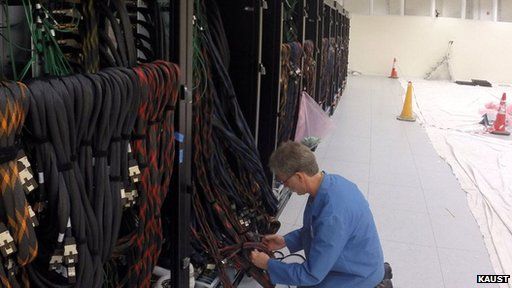
-
13 July 2015
- From the section Technology

For the first time a supercomputer based in the Middle East has entered the top ten list of the most powerful computers on the planet.
The Shaheen II is based at King Abdullah University of Science and Technology (Kaust) in Saudi Arabia.
The Cray XC40 computer is the seventh most powerful machine in the world, said the Top 500 organisation that monitors high-performance machines.
China’s Tianhe-2 retained its position at the top of the supercomputer list.
Weather models
Shaheen II’s place on the list was revealed in the Top 500’s latest release of its biannual rankings.
The Shaheen (Peregrine Falcon) II has a peak number-crunching capacity of 5.536 petaflops making it, said the Top 500, “the highest-ranked Middle East system in the 22-year history of the list and the first to crack the Top 10”.
Kaust has spent about $80m (£51m) buying, installing and operating the Cray machine which is about 25 times more powerful than the machine it is replacing.
The machine uses 200,000 processors arranged in more than 6,000 nodes, has 17.6 petabytes of storage and 790 terabytes of main memory. By contrast, China’s Tianhe-2 has a peak processing ability of 33.86 petaflops spread across 16,000 nodes.
A petaflop is equal to about one quadrillion calculations per second. One estimate suggests it would take a human about 32,000 years to complete the same task.
The machine, based in Thuwal, Saudi Arabia is being used for research projects modelling turbulence in engines, atmospheric dynamics, and renewable energy grids.
Industrial partners of Kaust are also planning to use it to help refine their search for minerals and fossil fuels and in the processing of raw materials.
In a blog entry detailing the latest list, the Top 500 organisation said the rate of growth in global computing power was slowing down. This was because relatively few new massive supercomputers had been switched on in the last few years. Many of those at the top of the list were installed and first operated in 2011 and 2012, it said.
